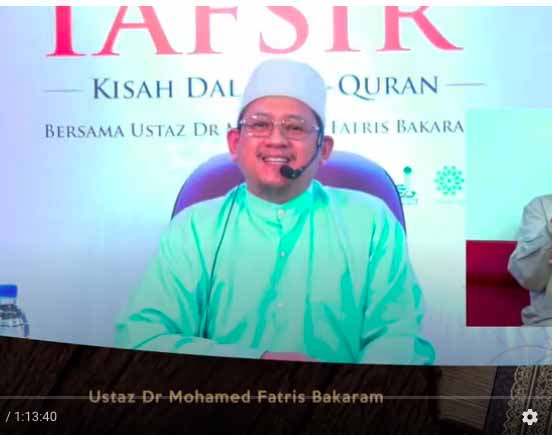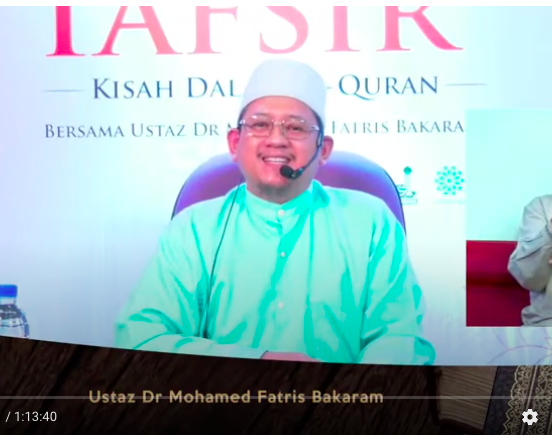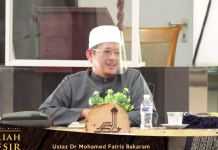This article is a summary of takeaways from Ustaz Dr Mohamed Fatris Bakaram’s Tafsir Online Lecture on 14th June 2020. Summaries of previous lectures on Surah Maryam and Surah Taha can be found here. This lecture is a continuation of the previous lecture after Surah Al Anbiya’ verses 85 to 86.
Prophet Yunus AS’ Story and His Amazing Du’a
وَذَا النُّونِ إِذ ذَّهَبَ مُغَاضِبًا فَظَنَّ أَن لَّن نَّقْدِرَ عَلَيْهِ فَنَادَىٰ فِي الظُّلُمَاتِ أَن لَّا إِلَٰهَ إِلَّا أَنتَ سُبْحَانَكَ إِنِّي كُنتُ مِنَ الظَّالِمِينَ
And remember Zhan-nun, when he went off in anger. He imagined that We would not punish him! Then he cried through the depths of darkness, “There is no god but You. You are Most Pure. I was indeed amongst the wrongdoers!” [21:87]
The Companion of the Big Fish
وَذَا النُّونِ
And remember Zhan-nun…
Based on the rules of Arabic grammar, the word Zhan-nun here can be read as Zhun-nun or Zhin-nun depending on the position of the word in the verse. If you remember, previously we talked about Zhulkifli? The word “Zhu” is used in both these names and it means, ‘he who owns’. The word “Nun” here means ‘a big fish’; it is often translated to mean a whale. We do not know which species of fish it is exactly, we just know that it is a type of big fish called Nun.
In this context, the phrase ‘Zhun-nun’ does not in fact mean ‘the owner of the big fish’, rather it translates into ‘the companion of the big fish’. This name is given to Prophet Yunus AS who was swallowed by the Nun for a period of time. During this period, it was as though they were keeping one another company. In these verses, Prophet Yunus AS’ name was not mentioned at all; the nickname ‘Zhun-nun’ was used instead.
إِذ ذَّهَبَ مُغَاضِبًا
… when he went off in anger…
Prophet Yunus AS’ story begins with him preaching to his people. Like many of the Prophets of Allah, his people stubbornly denied his message, choosing to stay in disbelief. At one point of time, Prophet Yunus AS went to his people with a warning, saying that if they refused to change their ways, Allah SWT was sure to send down His Punishment upon them.
His people ignored his warning and continued to proceed with their own misguided ways. It came to the point that Prophet Yunus AS got disheartened, disappointed and angry with his people. He then made the decision to leave his town before the Wrath of Allah SWT descends upon his people. This is what was narrated as “he went off in anger” in this verse.
فَظَنَّ أَن لَّن نَّقْدِرَ عَلَيْهِ
… He imagined that We shall not punish him! …
Prophet Yunus AS had thought that his actions of leaving his people was one that would not be punished by Allah SWT. Afterall, the prophets before him had done the same thing. Prophet Lut AS had left his disbelieving people before their destruction. Prophet Nuh AS had mounted the ark before the flood started. Prophet Yunus AS therefore concluded that leaving his people was not something he would be faulted for.
There is however a difference between what Prophet Yunus AS did, when compared to the prophets before him. The precedent prophets had left their people only after they were commanded to do so by Allah SWT. They had not left out of their own will or initiative. Prophet Yunus AS, had left out of anger, before the command was given by Allah SWT. He had thought himself blameless, but he was mistaken. Allah SWT showed that He did not agree with the actions of Prophet Yunus AS.
فَنَادَىٰ فِي الظُّلُمَاتِ
… So he cried through the depths of darkness…
Now if you notice, this verse shortcuts the story quite a bit. Allah SWT narrates to us that Prophet Yunus AS had departed from his people angrily, he had done so thinking that it was the right thing to do, that he would not be punished for it. And then the next thing we know is that Prophet Yunus AS was in pitch darkness. What happened in between is not mentioned here.
If you refer to Surah As-Saffat, there is a bit more detail added to this story. We are told that when Prophet Yunus AS reached the port, he had embarked on a ship. When a horrible storm hit them in the middle of the seas, the captain and crew decided that perhaps the ship was too heavy. They started dumping things and people out into the sea to lighten the load. When the lots were drawn to see who was to be thrown overboard, Prophet Yunus AS’ name was drawn thrice, one after another. Prophet Yunus AS made the decision that he would jump off the ship.
It was then that he realised that his actions of abandoning his people was one that was not accepted by Allah SWT. While he was in the seas, Prophet Yunus AS was swallowed alive and whole by a big fish that was sent by Allah SWT. Prophet Yunus found himself in pitch darkness, deep beneath the sea without any source of light, in the fish’s stomach. At that moment, Prophet Yunus AS made the following du’a.
As you can see, this story was not found in the verse above. This teaches us that in reading and learning the Qur’an, it is important for us to do a bit of cross-referencing. Do not just take a verse as it is and think that they exist independent of other verses. Repetitions in the Qur’an are frequent. Oftentimes, the same story may be narrated in different Surahs. In each of these, different details are highlighted. Together, these verses act in a way that complement one another, filling in the gaps in the stories.
The Du’a of Nabi Yunus
أَن لَّا إِلَٰهَ إِلَّا أَنتَ سُبْحَانَكَ إِنِّي كُنتُ مِنَ الظَّالِمِينَ
” There is no god but You. You are Most Pure. I was indeed amongst the wrongdoers.” [21:87]
This is such an important du’a. The words are brief and simple, yet the impact it has on the heart is immense, for whosoever decides to put it into practice. There are three key components to this supplication:
-
لاَ إِلَٰهَ إِلَّا أَنتَ
Laa ilaha illa anta
There is no God except you
-
سُبْحَانَكَ
Subhaanaka
You are Most Perfect and Pure
-
إِنِّي كُنتُ مِنَ الظَّالِمِينَ
Innii kuntu minaZholimiin
Verily I am amongst the wrongdoers
I would like to emphasise that this du’a is extremely important. There have been multiple narrations of a hadith from Prophet Muhammad SAW, where Rasulullah SAW was quoted to have said:
“By the Lord in whose Hands my life lies, whichever believer recites this supplication, then all of the problems and difficulties in his life will be eliminated by Allah SWT.”
In another narration, Rasulullah SAW insisted that,
“Whosoever recites the Du’a of Prophet Yunus, all of his requests will be answered by Allah SWT.”
Upon hearing this, some of the companions asked Rasulullah SAW, “O Rasulullah, does the acceptance of this du’a apply only to Prophet Yunus AS? Or is it general for all of us?”. Rasulullah SAW replied, “This du’a is specific to Prophet Yunus and is general for anyone who practices it.”
My dearest brothers and sisters, when you recite this du’a, all the hardships that you are undergoing will be eased. Whatever the restrictions may be that continue to threaten you will be replaced with expansion. Whatever harm has been inflicted upon you, causing you much suffering and pain, will be relieved from you by Allah. Whatever good that you desire in your heart, Allah SWT will surely accept, when He SWT answers your prayers.
Upon realising his mistake and finding himself in a tight spot, Prophet Yunus made this Du’a, acknowledging three things. Firstly, he acknowledged that Allah SWT is the Only God. Secondly, he acknowledged that Allah SWT is Most Perfect and Pure. Thirdly, he acknowledged that he had done wrong.
What is it that makes this du’a so special that Prophet Muhammad SWT was willing to swear upon its’ effectiveness? The secret of this du’a lies in the three key components. In life, there are times when you might feel profound pain and difficulty. It could be that you lost a significant portion of your wealth, perhaps some of your belongings were destroyed due to an incident, perhaps your livelihood was taken away, perhaps a dearly beloved person has left you for good, or perhaps you are struggling to cope with intense pain of sickness… There are so many different tests and trials that could affect us.
Regardless of what you are going through, the first thing to do is to acknowledge Allah SWT’s presence. Declare that He alone is worthy of worship. Before you even start asking Allah SWT for aid and relief, you need to start off by acknowledging that all that happened took place because of Allah SWT’s Will. We need to admit that our life and all that is in it, our trials and challenges, our ease and blessings and our final end, has all been determined by Allah SWT. Acknowledge the presence of Allah so that you do not forget who you really are. Human beings often fail in overcoming the challenges in life because they forget that they are mere servants of Allah and that they will never be able to escape from Allah’s Will.
Secondly, after acknowledging that Allah is God and that there is no one who has control over you but Him, then declare that Allah SWT is Most Pure. When we say this, we are saying that Allah SWT is free from any mistakes, ignorance, or faults. We acknowledge that even though we are struggling and facing pain in dealing with whatever the circumstances are, that Allah SWT was not mistaken in giving us these trials.
We are declaring that there is a Hikmah (wisdom) behind these tests. Allah SWT did not give us these trials because He wants to harm us or make life difficult for us just for the sake of it. Allah SWT is Most Pure; He is free from blame and fault. Claims of injustice and wickedness against His servants are therefore false. Allah SWT is free from any shortcomings and weaknesses; the ones who are weak are us, His servants. This is why we put our complete trust in Him, when overcoming the problems in our lives.
Even Prophets Make Mistakes
Prophet Yunus then proceeds to acknowledge his mistake, “I have erred, O Allah”. He had not; intentionally gone against the commands of Allah SWT. He was a Prophet, and was “Maksum”, meaning protected by Allah SWT from committing any major sins. Prophets are protected from doing evil deeds. They are protected by Allah from disobeying His Commands. However, as a human being, Prophet Yunus was not free from mistakes. And this is something that we see in other prophets as well. We saw how Prophet Adam slipped and forgot, leading him to eat the fruit of the Khuld tree. We saw how Prophet Musa accidentally killed a man when he hit him.
Even Prophet Muhammad SAW made mistakes. He was even admonished by Allah SWT in Surah ‘Abasa. This is a well-known story. There was a point of time when Rasulullah SAW was seated in a gathering, sharing the message of Islam with some tribal leaders. He had thought that if these leaders were to embrace Islam, all of their people would follow along with them. At that point of time, a blind companion of the prophet, Abdullah bin Ummi Maktum, came up to him to ask some questions. Rasulullah SAW did not entertain him. In fact, his face reflected a bit of annoyance. Allah SWT admonished him through the first verse in Surah ‘Abasa saying, “(The Prophet) frowned and turned away”.
This companion’s need for attention had seemed less urgent and important when compared to that of the group of leaders. However, Allah SWT knew the sincerity in Abdullah’s heart, so much so that He SWT admonished Rasulullah SAW in the Qur’an. Prophet Muhammad SAW had made an error; he had not committed a sin; he had not disobeyed any of Allah SWT’s commands. He had just made a decision based on the options he had: either to speak to a man who was already a believer, or to focus on his meeting with a group of potential believers, whose acceptance of Islam could lead to significant expansion in the believer population. He had chosen based on what he thought had been most apt, but Allah SWT had disagreed with his decision.
Similarly, Prophet Yunus AS had made a decision on his part that he thought was best. He had done his best to preach to his people for many decades but to no avail. He had already warned them of a coming punishment if they still refused to listen, and yet they persisted. He thought that there was nothing more that he AS could do for his people. If they were to be destroyed by Allah SWT, he AS was going to leave before the destruction came, so that he may perhaps head to another community that could potentially believe and accept his message. Prophet Yunus AS did not mean to disobey Allah SWT, he just made a misjudgement.
The Way Out of Darkness
Just like how Prophet Yunus AS had encountered darkness in his life, we too will have to face darkness. We might have to experience worry, fear, uncertainty, betrayal, abandonment, and loss. At the end of the day, we need to remember that regardless of what our circumstances may be, we always have Allah SWT. Turn back to Allah SWT and make the same du’a as Prophet Yunus. Say to Allah, “O Allah, there is no one worthy of worship of You – You alone have power over me. You are Most Pure – whatever that has happened to me is not a mistake, for You are free from error. I have indeed wronged – it is likely that whatever that has happened is a result of my own wrongdoings to You. Indeed, I am a servant who has done wrong.”.
We are human beings. Each and everyone of us has committed mistakes in our lives, we do not know which of our past sins may be weighing us down. Allah SWT could be using this moment as an opportunity to purify us and wipe away the sins that have blackened our hearts. This could be why Allah SWT has sent us these tests, as a means of showing His Love and Mercy to us.
Remember, dearest brothers and sisters, we are in very uncertain times. We do not know when the pandemic will end. We have seen some positive signs though; our mosques are reopening bit by bit, jobs are resuming gradually… There is still a lot of uncertainty for the things that are out of our control. We may worry about our livelihood and our health. Leave your worries to Allah SWT. Practise this du’a frequently. Teach it to your children. Remember to recite it in the day and at night. There is no specific quantity or time to be recited. Recite it whenever you remember it, wherever you are, whenever you find free time. It is a short but powerful du’a.
How confident are you of Rasulullah SAW’s promise? How confident are you of Allah SWT’s Generosity and Love? How confident are you that the small trial that you have to undertake is nothing compared to the oceans of Mercy and blessings that Allah SWT has bestowed upon us? How confident are you that the tests that you are undertaking are only temporary, whereas the rewards for your patience will be eternal in the Hereafter? If that faith and trust in your heart is lost, then there is no one who can help you anymore. So choose to put your complete trust in Allah SWT. Turn to Him and ask from Him SWT.
Allah SWT Answers Supplications Even Without Requests
فَاسْتَجَبْنَا لَهُ وَنَجَّيْنَاهُ مِنَ الْغَمِّ ۚ وَكَذَٰلِكَ نُنجِي الْمُؤْمِنِينَ
Then We answered his prayer and saved him from the anguish. Thus, do We save believers. [21:88]
Prophet Yunus had made a mistake. And as soon as he realised that, he had repented and turned to Allah SWT. He acknowledged his faults and sought hope from Allah SWT. So, Allah SWT saved him AS, just as He will save His other believing servants. This is the reason why Rasulullah SAW, when asked whether Prophet Yunus’ du’a was specific to him, replied that it is general to anyone who had Iman in their hearts.
Allah SWT says that He had “answered” the prayer of Prophet Yunus AS. This implies that a request had been fulfilled. However, if you have a look at the Du’a of Prophet Yunus, you cannot see a request being made. It seems to us that Prophet Yunus AS made three statements rather than requests. What du’a did Allah SWT refer to? What exactly did Prophet Yunus AS ask for? What was there to be answered?
This, my dearest brothers and sisters, shows us the relationship between Allah SWT and His servants. Allah SWT does not only hear what is spoken audibly. He SWT also hears what is kept hidden deep within our hearts. For every servant who calls upon Allah and praises Him whole-heartedly, Allah SWT hears what is on the flipside of the praise. Allah SWT understands and knows our deepest desires and our sincerest hopes of Him – and so He delivers, He answers, and He saves us.
A servant who makes endless audible requests from Allah SWT, but whose heart is empty of conviction and faith, then Allah SWT knows, that in fact what is spoken on the tongue is not really longed for in the hearts. This is why, dear brothers and sisters, when you speak to Allah SWT, you should speak out of the sincerity in your hearts and have full faith and confidence that Allah SWT will deliver upon His promise out of His Love and Generosity SWT.
I am reminded of a hadith of the Prophet SAW. A companion by the name of Ubayy bin Ka’ab RA came to meet Rasulullah SAW. He said to the Prophet SAW, “O Rasulullah, I really love saying Salawat upon you. What proportion of the supplications that I make to Allah SWT can I fill with Salawat upon you?”. The Prophet SAW replied, “That is up to you.”. Ubayy replied, “A quarter of it?”. Rasulullah SAW said, “That is up to you. But even more is also good.”. Ubayy asked, “How about half, O Rasulullah?”. Rasulullah SAW said, “That is up to you. But even more is also good.”. Ubayy asked again, “How about two-thirds, O Rasulullah?”. Rasulullah SAW said, “That is up to you. But even more is also good.”. Ubayy asked again, “If that is the case, then I will allocate all of my Supplication time to Salawat upon you O Rasulullah.”. Rasulullah SAW said, “That is permissible. If that is truly what you do, then Allah SWT will fulfil all of your needs and forgive all of your sins.”.
Subhanallah… Ubayy is saying that he RA will not make any requests throughout his supplication, spending the whole duration of his Du’a praising and sending Salawat upon the Prophet SAW. Yet, he is promised the complete fulfilment of his needs and forgiveness of his sins. This is the generosity of Allah SWT. He has never been nit-picky in counting our deeds. We are the ones who are always being nit-picky. We tell ourselves, “oh… whatever I’m doing is not even a sin, it’s just disliked by Allah”, or “oh… this sin is not a major sin, Allah will forgive me anyway.”, or “urgh… I have made this du’a for decades and Allah still has not granted it to me. I know of someone who only had to ask for a week and got what he wanted.”. We always enumerate our deeds with Allah, but Allah SWT does not enumerate our deeds – He does not tell us that what we do is not enough for him. Even if you do not make a request, Allah SWT answers you and gives you what you want and need.
Is there such a thing as too much Salawat?
When it comes to the Salawat, Rasulullah SAW has mentioned in a hadith that, “Whosoever says Salawat upon me once, Allah SWT will respond with Salawat ten times upon us.”. What does it mean to have Allah’s Salawat upon us? It means Allah SWT will shower His Mercy upon us, grant us Barakah, protect us from harm, fulfil our needs, sustain us in life, guide us in goodness… all of these are Salawat upon us. If Allah SWT sends His Salawat upon us ten times, imagine what goodness becomes available for us! Do not ever think lowly of Allah’s generosity towards us. In another hadith, Rasulullah SAW says, “Whosoever sends Salawat upon me, the angels will send Salawat upon him.”. Not only does Allah SWT send His Salawat to us, the angels do so as well.
This is why I do not understand the people who make it an issue that other people say “too many Salawat”. How can this be an issue? I’m saying this because just a few weeks ago, a close friend sent me a message asking for my opinion. A friend of his had asked him, “Why do you spend so much time saying Salawat, when your God is Allah not Rasulullah?”.
My response to this is that in Islam, we are encouraged to do good, in any way that we like. To those who like to do Sunnah prayers in addition to their Fardh prayers, they should go ahead with it. Those who enjoy fasting Sunnah fasts should go for it. Those who want to add on to their deeds by reciting the Qur’an should go for it. Those who prefer to say lots of Zikir and Istighfar should do so. Whoever wakes up early in the morning to do many rounds of Tahajjud is free to do so. We should not criticise him saying that he should be making du’a instead.
Someone who only wakes up right before Subuh to do two rakaat of Tahajjud should not be criticised, he could have been staying up late reciting the Qur’an. Someone who does not seem to do many good deeds but spends in charity freely should not be chastised for their lack of Sunnah Ibadah. Go for Umrah multiple times if you wish to do so, volunteer at the mosque if you want.
Do not let the words of others stop you from doing what you can do get Allah’s Redha. At the end of the day, what is important is that each of us takes care of what is wajib upon us. Whatever is done outside of that is completely between us and Allah. Do the deeds which fill your heart with sincerity, the ones from which you think are the most comfortable for you, in order to receive the blessings and love of Allah SWT. Do good deeds, whichever deeds they may be.
Allah SWT Sees all that you do. He Hears even the words that you do not say. He Knows your deepest desires and will answer your unspoken requests. May Allah SWT guide us to do good always. May He continue to count us amongst the believers who put our utmost faith and trust in Him May He bring us all out of darkness and into light, just as He had with Prophet Yunus AS.
Ameen.
Summary by: Arina Adom
Arina Adom is a lover of learning who takes on the world with an open mind. Resourceful and adaptable, always ready to take on new challenges. Comfortable working with diverse groups of people, yet able to work independently. Thrives under pressure. Currently seeking a meaningful career that enables her to impact lives directly and bring about positive changes in the lives of others in the community.
Arina graduated with a degree in Science ( Hons ), Life Science from NUS. She is currently taking a diploma in Quran and Sunnah Studies from Al Zuhri.
Watch Kuliah Tafsir again at
Masjid Darul Makmur’s Youtube
Watch and follow Kuliah Tafsir weekly
every Sunday after solat Maghrib
organised by Masjid Darul Makmur
Your contributions are appreciated. Get more details by clicking the image below.












